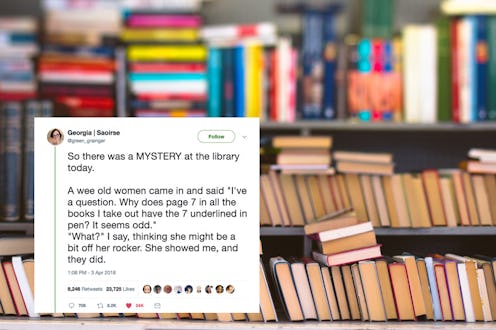Libraries can be the perfect place for magic and mystery, and this Scottish library mystery is a case for Nancy Drew. It all started when a "wee old woman" came to Georgia, a Dundee, Scotland library assistant, with a question: Why was the seventh page number underlined in every book she checked out? The answer turned out to be a lot less sinister than anyone expected, but you'll have to read on to find out exactly what was behind the Mystery of the Seventh Pages.
Let's back up for a moment. I know it's a stereotype to say that "wee old women" have certain genres they enjoy reading, but many librarians and booksellers will tell you that romances, mysteries, and historical fiction titles — or some permutation of the three — are immensely popular among older ladies. For example, Georgia remarks that many patrons like the unnamed Wee Old Woman who brought the Mystery of the Seventh Pages to her attention enjoy reading "romances set in wartime Britain," although she doesn't say which book in particular the patron was reading at the time.
Georgia says she is new to the library in Dundee, so she asked a supervisor for clues as to why someone would mark up the seventh page of certain books that the Wee Old Woman liked. The more experienced librarian knew exactly why those British romances were getting — minorly — vandalized.
That's a pretty neat trick, especially if you're someone who reads deeply in the same genre. I know I would have trouble telling certain mysteries and romances apart just from their covers and titles. If you find yourself taking a new bag of books home, only to discover that you've already read most of them, having a markup system that's unique to you could be the solution.
Unfortunately, as Georgia points out, the library in Dundee, like many others, has a computer system that records the books patrons check out, so that librarians can help readers identify titles they have already read. Viewed in this light, marking up books could appear to be more sinister than you might have suspected.
However, as other Twitter users pointed out, marking books in a manner that does not interfere with future patrons' reading of them is a great solution for elderly folks, people with memory problems, or those who have autism, anxiety, selective mutism, or another neurodivergent condition.
Finally, Georgia reminded us all that this could be the beginning of a beautiful new romance.
I'd read that book — and mark it on page seven.
